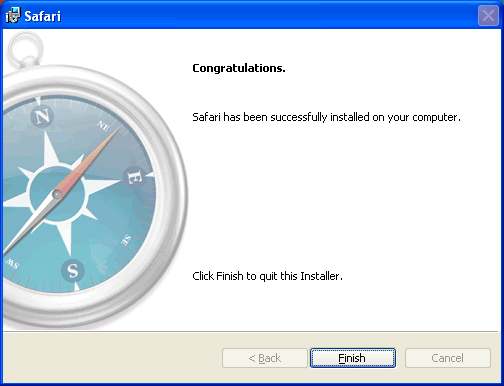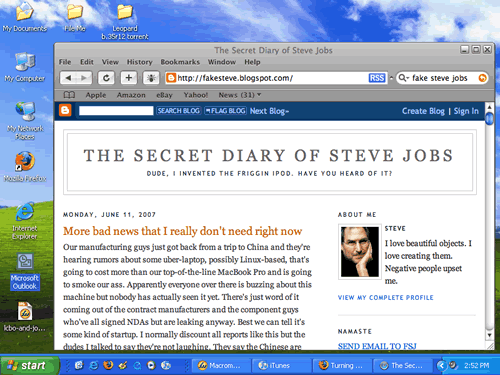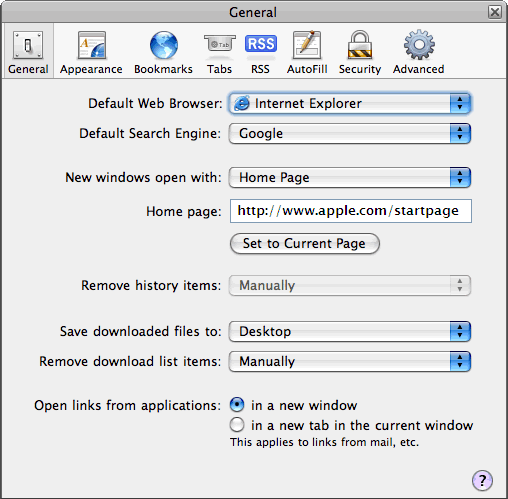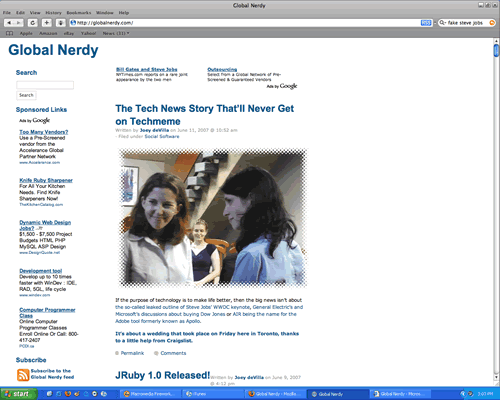I’m surprised this didn’t happen sooner, but someone — SarcasticGamer.com, the folks behind the How to Kill Your Brand video — has finally created a parody of Microsoft’s “you should be in awe, or at least think we still have some ‘game’ left” ads for Surface, their vision of “big-ass table” computing:

Although I credit David Isenberg with coming up with the concept of the Stupid Network and why it’s a good thing, it may take a guy like Mr. T. to popularize the notion that a system’s “smarts” don’t belong in its network. By way of Andy Baio’s site, Waxy.org (he found it at Flipzagging), here’s a video of Mr. T. extolling the virtues of Hitachi’s storage virtualization:
When my co-worker James “Yes, that’s my real last name” Koole and I heard about Safari coming in a windows version, we had to give it a try.
We hit the Apple site as soon as Steve’s keynote was over and kept hitting it until one of us got the updated version of the site. From there, it didn’t take too long to get to the download page — James won the cache/download lottery — for the Safari public beta. Soon afterwards, this was on the screen of my Windows XP box:

I seem to have fallen into a parallel universe.
The installer took a couple of minutes to get the job done, but we finally hit this screen:

Done!
And then we were off to the races. I fired it up and hit Fake Steve Jobs’ blog…

Click the picture to see it at full size.
A Couple of Observations
Non-standard UI
Safari for Windows looks even less like a Windows app than iTunes, what with its use of many Mac-ish user interface touches, from the use of Lucida Grande as the menu font, down to the Aqua controls in the “Preferences” dialog box, shown below:

Yes, this is actually a dialog box in Windows!
Fast rendering
This was one of the features that Steve was touting at the keynote. I haven’t pulled out a stopwatch yet, but I’ve hit a number of sites that always take more time to render and wow, does Safari seem to render them quickly! And remember, this app is so newly installed that there’s nothing in its cache.
It doesn’t recognize the mouse scroll wheel
Moving the cursor over a scrollable page and using the scrollwheel didn’t work in Safari for Windows. I then switched to IE and the scroll wheel worked just fine, and it also worked for Firefox.
Better-looking rendering of pages
Safari seems to render web pages in such a way that they’re more beautiful than the same versions rendered in IE and Firefox.
Here’s the current Global Nerdy front page as rendered by Internet Explorer 6:
![Global Nerdy, as seen in IE 6 [preview]](http://globalnerdy.com/wordpress/wp-content/uploads/2007/06/global-nerdy-on-ie-preview.gif)
Click the picture to see it at full size.
Here’s the same page rendered by Firefox:

Click the picture to see it at full size.
And finally, here’s the same page in Safari. Note how differently the text is rendered…

Click the picture to see it at full size.
On first glance, I like Safari’s font rendering the best. I’m going to have to noodle more with Safari for Windows before writing more, but for now, it does seem pretty nice.
If the purpose of technology is to make life better, then the big news isn’t about the so-called leaked outline of Steve Jobs’ WWDC keynote, General Electric’s and Microsoft’s discussions about buying Dow Jones or AIR being the name for the Adobe tool formerly known as Apollo.
JRuby 1.0 Released!
 It hasn’t even been a year since Sun hired JRuby contributors Charles Nutter and Thomas Enebo to work on it full-time. It’s been an even shorter period since Ola Bini (whom I had the pleasure of meeting at RailsConf 2007) got hired to do the same by Thoughtworks.
It hasn’t even been a year since Sun hired JRuby contributors Charles Nutter and Thomas Enebo to work on it full-time. It’s been an even shorter period since Ola Bini (whom I had the pleasure of meeting at RailsConf 2007) got hired to do the same by Thoughtworks.
In that short span of time, they’ve done something impressive: they (and all the other contributors involved) have brought JRuby to version 1.0.
The release is being termed as “Ruby compatible” with all known JRuby bugs causing incompatibilities with Matz’s Ruby (MRI) resolved. Applications should “just work” out of the box.
Here’s InfoQ’s summary of Charles Nutter’s roadmap for JRuby post version 1.0:
- Performance:
In the last year speed has been increased by an order of magnitude and a JIT compiler has been enabled. The team will continue to work on improving the JRuby speed and performance.- Java Integration: Today libraries can be called, interfaces implemented, and classes extended. Edge cases exist however. A redesigned integration API is targeted for 1.1.
- Ruby 2.0 and Rubinius: The goal is to support Ruby 2.0 and Rubinius byte code execution soon.
We at Global Nerdy would like to congratulate the JRuby (and NetBeans) teams on a job well done. We salute you with a filet mignon on a flaming sword!
“Bloggin’ ‘Bout My Generation”
Here’s the current xkcd comic:

Click the comic to see it on its original page at full size.
 According to this quiz that rates a programmer’s personality type along four axes in a manner similar to the Myers-Briggs Personality Index, my programmer personality type is DHSB, which means:
According to this quiz that rates a programmer’s personality type along four axes in a manner similar to the Myers-Briggs Personality Index, my programmer personality type is DHSB, which means:
- D as in doer: “You are very quick at getting tasks done. You believe the outcome is the most important part of a task and the faster you can reach that outcome the better. After all, time is money.” This is the opposite of a planner.
- H as in high-level: “The world is made up of objects and components, you should create your programs in the same way.” This is the opposite of low-level.
- S as in solo. “The best way to program is by yourself. There’s no communication problems, you know every part of the code allowing you to write the best programs possible.” This is the opposite of team.
- B as in liBeral. “Programming is a complex task and you should use white space and comments as freely as possible to help simplify the task. We’re not writing on paper anymore so we can take up as much room as we need.” This is the opposite of conservative.
If you’re curious as to what the various ends of the programmer personality type axes for this quiz are, here’s a page that lists them all.
Give the test a try and feel free to report your results in the comments!
